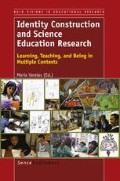Abstract
Using qualitative methods of data collection and analysis, this study explores positional identity as a lens for understanding elementary preservice teachers’ discourse around identity and science teaching. The three preservice teachers in the study were enrolled in a 16-week science methods course. At the conclusion of the course, they agreed to participate in this study to explore early understandings of positional identity and science teaching. The findings suggest that positional identity is a useful lens for understanding the complex ways in which preservice teachers discuss who they are, and how they view self and teaching.
Access this chapter
Tax calculation will be finalised at checkout
Purchases are for personal use only
Preview
Unable to display preview. Download preview PDF.
References
Abell SK. From professor to colleague: Creating a professional identity as collaborator in elementary science. Journal of Research in Science Teaching. 2000;37:548–562.
Agee J. Negotiating a teaching identity: An African American teacher's struggle to teach in test-driven contexts. Teachers College Record. 2004;104:747–774.
Beijaard D. Teachers' prior experiences and actual perceptions of professional identity. Teachers and Teaching: Theory and Practice. 1995;1:281–294.
Beijaard D, Meijer PC, Verloop N. Reconsidering research on teachers' professional identity. Teaching and Teacher Education. 2004;20:107–128.
Britzman DP. The terrible problem of knowing thyself: Toward a poststructural account of teacher identity. Journal of Curriculum Theorizing. 1992;9:23–46.
Brown BA. Discursive identity: Assimilation into the culture of science and its implication for minority students. Journal of Research in Science Teaching. 2004;41:810–834.
Carlone HB. The cultural production of science in reform-based physics: Girls' access, participation, and resistance. Journal of Research in Science Teaching. 2004;41:392–414.
Charmaz K. Constructing grounded theory: A practical guide through qualitative analysis. Thousand Oaks, CA: Sage; 2006.
Chavez LF, Guido-DiBrito F. Racial and ethnic identity and development. New Directions for Adult and Continuing Education. 1999;84:39–47.
Cobb P. Mathematics, literacies, and identity. Reading Research Quarterly. 2004;39:333–337.
Cooper CW. School choice and the standpoint of African American mothers: Considering the power of positionality. Journal of Negro Education. 2005;74:174–189.
Creswell JW. Qualitative inquiry and research design: Choosing among five approaches. Thousand Oaks, CA: Sage Publications; 2007.
Franzak JK. Developing a teacher identity: The impact of critical friends practice on the student teacher. English Education. 2002;34:258–281.
Gee GP. Identity as an analytic lens for research in education. Review of Research in Education. 2002;25:99–125.
Guba EG, Lincoln YS. Third generation evaluation. Newbury Park, CA: Sage; 1989.
Kozoll RH, Osborne MD. Finding meaning in science: Lifeworld, identity, and self. Science Education. 2004;88:157–181.
Lee, S. J. (1994). Behind the model-minority stereotype: Voices of high- and low-achieving Asian American students. Anthropology & Education Quarterly, 25, 413–429.
Maher, F. A., & Tetreault, M.K.T. (1994). The feminist classroom. New York, NY: Basic Books.
Martin, R. J., & Van Gunten, D.M. (2002). Reflected identities: Applying positionality and multicultural social reconstructionism in teacher education. Journal of Teacher Education, 53(1), 44–54.
Mensah, F. M. (2011). The DESTIN: Preservice teachers' drawings of the ideal elementary science teacher. School Science and Mathematics, 111, 379–388.
Merriam, S. B. (2009). Qualitative research: A guide to design and implementation. San Francisco: Jossey-Bass, Inc.
Moore FM. Positional identity and science teacher professional development. Journal of Research in Science Teaching. 2008a;45:684–710.
Moore FM. Agency, identity, and social justice: Preservice teachers' thoughts on becoming agents of change in urban elementary science classrooms. Research in Science Education. 2008b;38:589–610.
Parsons AC, Mensah FM. Black feminist thought: The lived experiences of two black female science educators. In: Scantlebury K, Kahle JB, Martin SN, editors. Re-visioning science education from feminist perspectives: Challenges, choices and careers. Rotterdam, The Netherland: Sense Publishers; 2010. p. 13–24.
Solórzano DG, Yossso T. Critical race methodology: Counter-storytelling as an analytical framework for education research. Qualitative Inquiry. 2002;8(1):23–44.
Spillane JP. A fifth-grade teacher's reconstruction of mathematics and literacy teaching: Exploring interactions among identity, learning, and subject matter. The Elementary School Journal. 2000;100:307–327.
Stake RE. Reconsidering generalization and theory in case study research. Paper presented at the Annual Meeting of the American Educational Research Association. Chicago: Illinois; 2007.
St. Pierre, E. A. (2000). Poststructural feminism in education: An overview. Qualitative Studies in Education, 13, 477–515.
Tetreault MKT. Classrooms for diversity: Rethinking curriculum and pedagogy. In: Banks JA, Banks CAM, editors. Multicultural education: Issues and perspectives. 2nd ed. Boston: Allyn & Bacon; 1993. p. 129–148.
Wenger E. Communities of practice. New York: Cambridge University Press; 1998.
Author information
Authors and Affiliations
Editor information
Editors and Affiliations
Rights and permissions
Copyright information
© 2012 Sense Publishers
About this chapter
Cite this chapter
Mensah, F.M. (2012). Positional Identity as a lens for Connecting Elementary Preservice Teachers to Teaching in Urban Classrooms. In: Varelas, M. (eds) Identity Construction and Science Education Research. Bold Visions in Educational Research, vol 35. SensePublishers, Rotterdam. https://doi.org/10.1007/978-94-6209-043-9_8
Download citation
DOI: https://doi.org/10.1007/978-94-6209-043-9_8
Publisher Name: SensePublishers, Rotterdam
Online ISBN: 978-94-6209-043-9
eBook Packages: Humanities, Social Sciences and LawEducation (R0)

